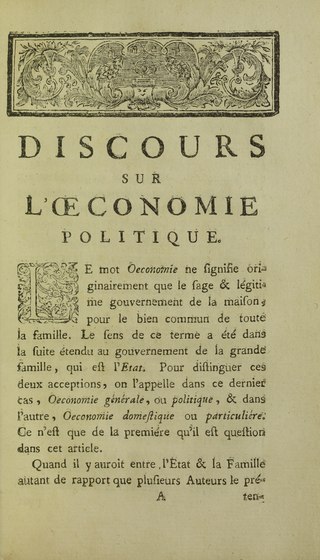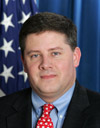Related Research Articles
The Austrian School is a heterodox school of economic thought that advocates strict adherence to methodological individualism, the concept that social phenomena result exclusively from the motivations and actions of individuals. Austrian school theorists hold that economic theory should be exclusively derived from basic principles of human action.

Political economy is a branch of political science and economics studying economic systems and their governance by political systems. Widely studied phenomena within the discipline are systems such as labour markets and financial markets, as well as phenomena such as growth, distribution, inequality, and trade, and how these are shaped by institutions, laws, and government policy. Originating in the 16th century, it is the precursor to the modern discipline of economics. Political economy in its modern form is considered an interdisciplinary field, drawing on theory from both political science and modern economics.

Kenneth Joseph Arrow was an American economist, mathematician, writer, and political theorist. He was the joint winner of the Nobel Memorial Prize in Economic Sciences with John Hicks in 1972.

The Hoover Institution is an American public policy think tank and research institution that promotes personal and economic liberty, free enterprise, and limited government. While the institution is formally a unit of Stanford University, it maintains an independent board of overseers and relies on its own income and donations. Fellowship appointments do not require the approval of Stanford tenure committees. It is widely described as a conservative institution, although its directors have contested its partisanship.

Jane Elizabeth Lathrop Stanford was an American philanthropist and co-founder of Stanford University in 1885, along with her husband, Leland Stanford, in memory of their only child, Leland Stanford Jr., who died of typhoid fever at age 15 in 1884. After her husband's death in 1893, she funded and operated the university almost single-handedly until her unsolved murder by strychnine poisoning in 1905.

Edwin Robert Anderson Seligman (1861–1939), was an American economist who spent his entire academic career at Columbia University in New York City. Seligman is best remembered for his pioneering work involving taxation and public finance. His principles for a progressive federal income tax were adopted by Congress after the passage of the Sixteenth Amendment. A prolific scholar and teacher, his students had great influence on the fiscal architecture of postcolonial nations. He served as an influential founding member of the American Economics Association.

Keith Hennessey is an American economist and former political advisor who served as the Assistant to the U.S. President for Economic Policy and Director of the National Economic Council. He was appointed to the position in November 2007 by President George W. Bush, and served until the end of Bush's second term in office. Hennessey had served in the White House since August 2002, when he was appointed to the position of Deputy Assistant to the President for Economic Policy and Deputy Director of the U.S. National Economic Council.

John Brian Taylor is the Mary and Robert Raymond Professor of Economics at Stanford University, and the George P. Shultz Senior Fellow in Economics at Stanford University's Hoover Institution.

Paul Michael Romer is an American economist and policy entrepreneur who is a University Professor in Economics at New York University. Romer is best known as the former Chief Economist of the World Bank and for co-receiving the 2018 Nobel Memorial Prize in Economic Sciences for his work in endogenous growth theory. He also coined the term "mathiness," which he describes as misuse of mathematics in economic research.

Edward Alsworth Ross was a progressive American sociologist, eugenicist, economist, and major figure of early criminology.
The Virginia School of political economy is a school of economic thought originating at the Thomas Jefferson Center for Studies in Political Economy of the University of Virginia in the 1950s and 1960s. Some of its proponents established the Center for Study of Public Choice at Virginia Tech in 1969, moving it to George Mason University in 1983. The school focuses primarily on public choice theory, constitutional economics, and law and economics.

William G. "Bill" Gale is the Arjay and Frances Miller Chair in Federal Economic Policy and the former vice president and director of the Economic Studies Program at the Brookings Institution. He conducts research on a variety of economic issues, focusing particularly on tax policy, fiscal policy, pensions and saving behavior. He is also co-director of the Tax Policy Center, a joint venture of the Brookings Institution and the Urban Institute. Gale attended Duke University and the London School of Economics and received his Ph.D. from Stanford University in 1987.
The Carnegie School is a school of economic thought originally formed at the Graduate School of Industrial Administration (GSIA), the current Tepper School of Business, of Carnegie Institute of Technology, the current Carnegie Mellon University, especially during the 1950s to 1970s.
Nathan Rosenberg was an American economist specializing in the history of technology.
The American Law and Economics Association (ALEA), a United States organization founded in 1991, is focused on the advancement of economic understanding of law, and related areas of public policy and regulation. It promotes research in law and economics. The organization's official journal is the American Law and Economics Review, established in 1999.
The Tepper School of Business is the business school of Carnegie Mellon University. It is located in the university's 140-acre (0.57 km2) campus in Pittsburgh, Pennsylvania.
Masahiko Aoki was a Japanese economist, Tomoye and Henri Takahashi Professor Emeritus of Japanese Studies in the Economics Department, and Senior Fellow of the Stanford Institute for Economic Policy Research and Freeman Spogli Institute for International Studies at Stanford University. Aoki was known for his work in comparative institutional analysis, corporate governance, the theory of the firm, and comparative East Asian development.
B. Douglas Bernheim is an American professor of Economics, currently the Edward Ames Edmunds Professor of Economics at Stanford University; his previous academic appointments have included an endowed chair in Economics and Business Policy at Princeton University and an endowed chair in Insurance and Risk Management at Northwestern University’s J.L. Kellogg Graduate School of Management, Department of Finance. He has published many articles in academic journals, and has received a number of awards recognizing his contributions to the field of economics. He is a partner with Bates White, LLC an economic consulting firm with offices in Washington, D.C., and San Diego, California.

Mary Jean Bowman was an American economist who mostly focused on education economics.
Donald Jasper Harris is a Jamaican-American economist and professor emeritus at Stanford University, known for applying post-Keynesian ideas to development economics. He is the father of the 49th and current vice president of the United States, Kamala Harris, as well as of her sister, lawyer and political commentator Maya Harris.
References
- ↑ George Leland Bach, Stanford Graduate School of Business. Accessed 22 December 2020.
- ↑ Phillip Saunders, 'George Leland Bach: 1915–1994', The Journal of Economic Education, Vol. 26, Issue 2 (1995), pp.99-100